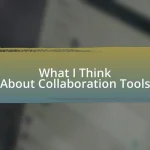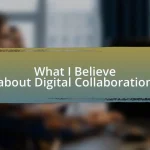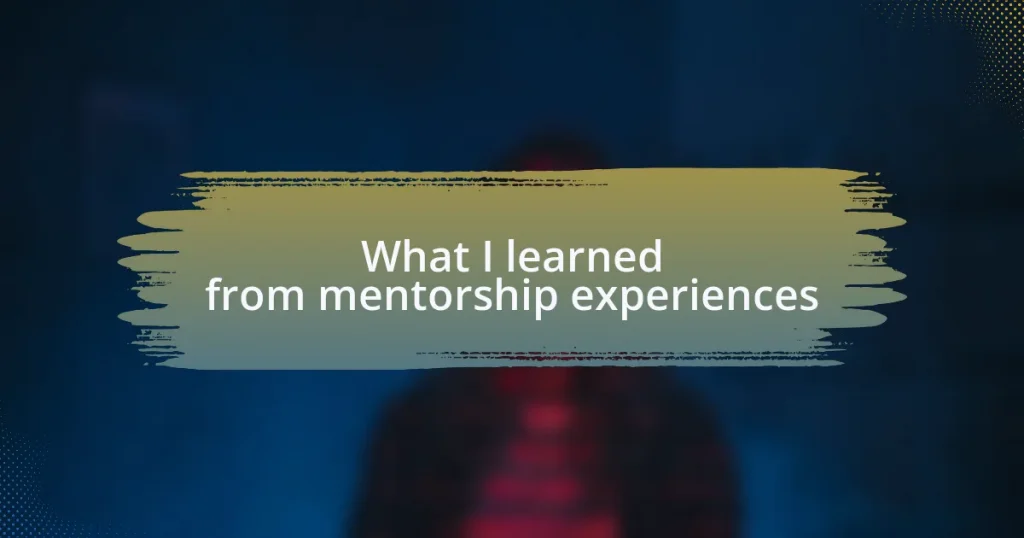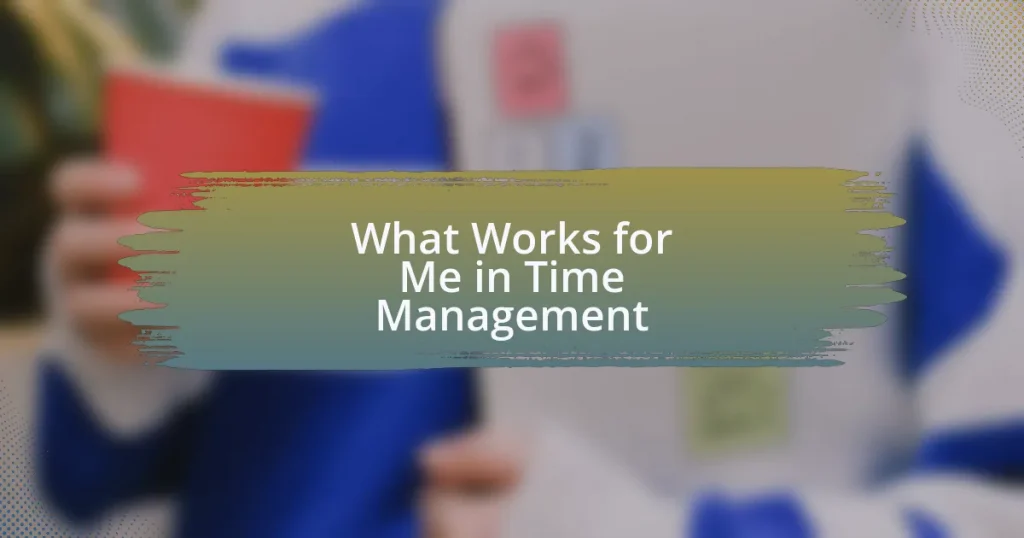Key takeaways:
- Mentorship in web development fosters creativity and problem-solving skills, emphasizing the importance of understanding real-world applications of coding.
- Emotional support from mentors builds confidence, turning challenges into opportunities for growth and enhancing communication abilities.
- Networking through mentorship opens doors to collaboration and professional growth, demonstrating the value of community in the tech industry.
- Learning to embrace failure and ask questions are crucial lessons that contribute to resilience and the ability to overcome challenges in development.
Author: Charlotte Everly
Bio: Charlotte Everly is an accomplished author known for her evocative storytelling and richly drawn characters. With a background in literature and creative writing, she weaves tales that explore the complexities of human relationships and the beauty of everyday life. Charlotte’s debut novel was met with critical acclaim, earning her a dedicated readership and multiple awards. When she isn’t penning her next bestseller, she enjoys hiking in the mountains and sipping coffee at her local café. She resides in Seattle with her two rescue dogs, Bella and Max.
Understanding mentorship in web development
Mentorship in web development is a transformative experience that goes beyond simply acquiring technical skills. I remember my first mentorship meeting where I was not only shown how to code but also encouraged to explore my creativity. This made me realize that mentorship is about fostering an environment where questions are welcomed and ideas can flourish.
Have you ever felt stuck while learning a new programming language? I certainly have. My mentor shared an invaluable insight: “It’s not just about knowing the code; it’s about understanding how it fits into solving real-world problems.” This perspective shifted how I approached challenges, turning them into opportunities for growth rather than obstacles.
Moreover, the emotional support that comes from a mentor cannot be overstated. During a particularly challenging project, I felt overwhelmed and doubted my abilities. My mentor not only guided me through the technical aspects but also reassured me that struggle is part of the learning process. This human connection made a world of difference, reminding me that mentorship is as much about building confidence as it is about skill-building.
Importance of mentorship in tech
In tech, mentorship serves as a crucial bridge between theory and practice. When I first dived into front-end development, my mentor helped me navigate the complex landscape of frameworks and libraries. I often found myself wondering, “Which tool is the right one for my project?” Having someone guide me through those decisions was invaluable, allowing me to focus on building rather than getting overwhelmed by choices.
It’s easy to underestimate the power of having someone believe in you. I can recall moments of self-doubt when learning about backend systems. My mentor consistently encouraged me, reminding me that even seasoned developers were once beginners grappling with the same learning curve. This emotional reassurance not only silenced my insecurities but also ignited a passion for problem-solving that I hadn’t felt before.
Additionally, mentorship fosters a network that extends beyond just one-on-one interactions. Through my mentor, I was introduced to a community of like-minded individuals who shared similar challenges and successes. Have you ever attended a meet-up where you felt energized by sharing insights? That sense of belonging is a vital part of professional growth in tech, showing that mentorship is not just about individual learning—it’s about creating lasting connections that enhance our journey.
Key skills gained from mentorship
One of the key skills I gained through mentorship was effective communication. I remember a specific project where my mentor urged me to present my ideas during our team meetings. Initially, I was hesitant and worried about stumbling over my words. However, with their encouragement, I learned how to articulate my thoughts clearly and concisely, fostering a sense of confidence. This skill has proven invaluable, allowing me to collaborate better with colleagues and share my insights without hesitation.
Another significant takeaway was time management. Early in my mentorship, I struggled to juggle multiple tasks—a common challenge in web development. My mentor introduced me to various planning tools and techniques, like the Pomodoro Technique. Implementing these strategies not only helped me prioritize my workload but also improved my productivity immensely. I often reflect on how these time management skills have shaped my approach to deadlines and project milestones.
Finally, I developed a deeper understanding of problem-solving. There were instances when I faced seemingly insurmountable bugs that triggered waves of frustration. My mentor taught me to break problems down into smaller, manageable parts instead of feeling overwhelmed. This method not only eased my anxiety but also transformed how I tackle challenges. Have you ever felt stuck on a coding issue? Embracing this problem-solving mindset has enabled me to approach obstacles with a clearer perspective, ultimately enhancing my growth as a developer.
Real world applications of mentorship
Real world applications of mentorship
One major real-world application of mentorship is the ability to navigate the job market more effectively. I recall a time when my mentor shared insider tips during our discussions about interviews. Their insight into what employers really look for helped me tailor my resume and prepare for my first technical interviews. Have you ever felt lost in the job search? This guidance not only boosted my confidence but also made me stand out from other candidates, demonstrating how mentorship can bridge the gap between education and professional opportunities.
The impact of mentorship extends beyond individual skill enhancement; it fosters a sense of community within the tech industry. I vividly remember attending a networking event with my mentor, where they introduced me to various professionals. These connections led me to collaborative projects that not only enriched my portfolio but also taught me the importance of networking. Isn’t it incredible how one relationship can open doors to countless opportunities? This highlights how mentorship can create a ripple effect, encouraging collaboration and learning throughout the entire field.
Moreover, mentorship instills a growth mindset that’s applicable in everyday life. I once struggled with incorporating new technologies into projects, feeling overwhelmed by the pace of change. My mentor encouraged me to embrace lifelong learning, suggesting resources and courses to stay updated. This shift in perspective helped me understand that learning doesn’t stop after formal education. Are you open to continuous growth? Recognizing mentorship as a catalyst for lifelong learning has made navigating the ever-evolving landscape of web development much more exciting and rewarding for me.
Personal experiences in web development
When I first started my journey in web development, I was overwhelmed by the sheer volume of information available. I clearly remember a late-night coding session when I felt stuck on a project, frustrated and ready to give up. It was then that my mentor reached out with a simple text: “Have you tried breaking it down into smaller tasks?” That advice transformed my approach, reminding me that even the most complicated projects can be tackled step by step. Have you ever faced a similar moment of doubt?
Another profound lesson came from a project where a tight deadline loomed. I was hesitant, fearing I wouldn’t meet the expectations. My mentor suggested I focus on my core skills and build from there. We even paired up for a coding session, turning what could have been a stressful situation into a collaborative learning experience. It was thrilling to see how our combined efforts made the project shine. Has teamwork ever sparked a new level of creativity for you?
As I delved deeper into my development skills, I learned the importance of sharing knowledge. I remember organizing a small workshop for fellow aspiring developers, inspired by my mentor’s belief in giving back. The joy of seeing “aha!” moments on their faces was priceless. It reminded me that teaching not only reinforces my own learning but also fosters a supportive community. Have you thought about how sharing what you know could impact others?
Lessons learned from my mentors
One significant lesson I learned from my mentors is the importance of asking questions. I remember sitting in a development meeting where I felt lost amid the technical jargon. My mentor reminded me that clarity often begins with inquiry. This simple act transformed my understanding, empowering me to seek help when needed. Have you ever found that a single question can open doors to new insights?
Another valuable lesson was to embrace failure as part of the journey. I vividly recall a project I poured my heart into, only to have it falter during a critical presentation. Instead of dwelling on my disappointment, my mentor encouraged me to analyze what went wrong and view it as a learning opportunity. That shift in perspective allowed me to cultivate resilience, proving that setbacks often lead to the most profound growth. How do you typically respond to challenges in your own work?
Lastly, I discovered the power of networking through my mentorship experiences. A mentor once took me to a local tech meet-up, where I connected with others who shared my passion for development. The conversations we had not only broadened my knowledge but also opened up potential collaboration opportunities. Have you considered how a single connection can shape your career path in unexpected ways?















